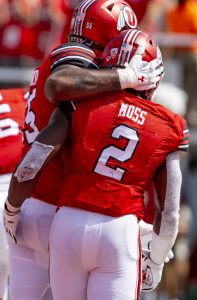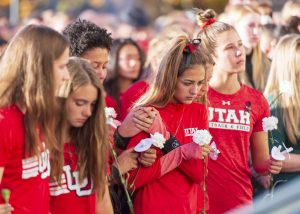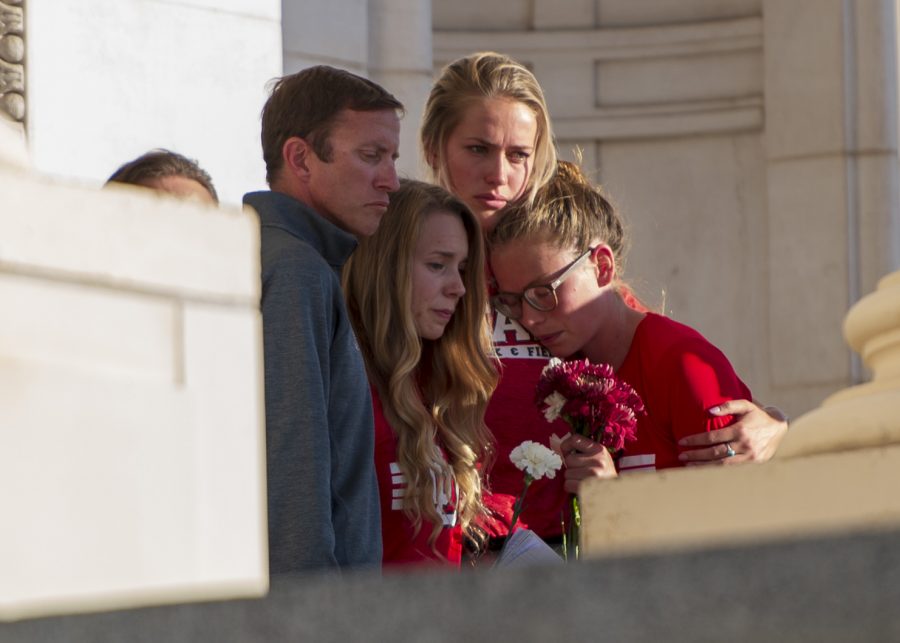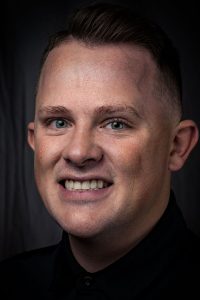Fueled by Pain: How Utah Athletes Used Sports to Heal After Tragedy
Students, staff, family and friends attend a vigil on the steps of the Park Building for Lauren McCluskey who was tragically killed on campus at The University of Utah in Salt Lake City, Utah on Wednesday, Oct. 24, 2018. (Photo by Kiffer Creveling | The Daily Utah Chronicle)
October 16, 2019
What does a grieving process look like? Does it involve sitting in a bedroom and letting out a good cry? What about spending time with those closest to you and reminiscing on good memories? Maybe it’s distracting the mind for a few hours by doing something you love.
Throughout history, sporting events have been part of a healing process for athletes and fans alike.
For athletes, tragedy can be a form of added motivation to play for those lost or afflicted. In the case of fans, sporting events can fill the wounds of the world and bring aid to an exhausted mind.
Here at the University of Utah, we have our own athletes that have had to overcome adversity of their own. In one case, there’s an offensive lineman leading the Utes onto the field not long after the death of his brother, and in another, we have a track and field star running in remembrance of a friend and teammate killed on campus only a few months prior.
Michael Ford
Many know of Nick Ford as a nasty, intimidating presence on the offensive line for Utah’s nationally ranked football team. What some people might not know is that Ford’s older brother Michael recently passed away from a congenital heart disease.
Michael and Nick were inseparable throughout their years together. They had each other’s backs, rooted one another on and supported each other through thick and thin.
“He meant a lot to me. He was my older brother and best friend,” Ford said.“We shared a room until high school, so I spent every second of my life with him.”
Michael’s heart disease was never a burden for the Ford family to deal with. His having it, though, helped his family members to grow up quickly and learn to put others’ needs before their own.

“It exposed me to adversity early on and forced me to grow up quickly in certain situations,” Ford said. “As a kid, lots of people don’t know how to be selfless or put others before themselves. I was forced to be put in that situation and learn quicker than a lot of kids and learn some lessons quicker than even a lot of grown-ups today.”
When Michael passed, Ford had to put football on the back burner to take care of what was most important in life — family. Family has always been a major factor in Ford’s life. Since he was young, his father taught him and his siblings to take care of one another and be there for each other, especially in situations that might be hard to get through.
Michael’s passing was no different. Ford looked to his dad for inspiration and buckled down to help those he loves most push through one of the toughest times of their lives.
“As soon as it happened, my dad went and took care of my brother who had passed,” Ford said. “I took my mom home, then took her out to eat. I made sure I took care of my brother and sister and my mom. I didn’t cry in front of anyone. I was raised in a traditional way where the man is supposed to be strong and not show emotion. Did that stuff happen? Yeah, it was devastating to me. But I couldn’t break down in front of my mom if I was the one who was supposed to be strong and take care of her.”
Michael’s passing has helped Nick to never waste a moment and never take things for granted. Ford acknowledged that life is short and said that he finds it frustrating when he sees people wasting their moments. He has made it a goal to never waste a moment and take advantage of the opportunities that come his way.
Those moments mostly come throughout everyday life, but they also find their way onto the football field.
“This season’s been different from other seasons because I’m trying to not waste any moments,” Ford said. “At the same time, though, it hasn’t been different because I’ve always had the same mindset. It’s just more concrete and reassuring now than it ever was before.”
Lauren McCluskey
Oct. 22, 2018: a day etched in the minds of the U family for all of the wrong reasons. Lauren McCluskey, a beloved friend, daughter, classmate and member of the U’s track and field team lost her life in a disgusting act of violence.
As the news hit on that cool, autumn evening, everyone’s minds were filled with horror, worry and concern — none more so than the McCluskey family and the team Lauren wouldn’t be returning to.
Brooke Martin, a teammate and friend of McCluskey, said, “It was a nightmare. I woke up and got the emails at about 1 a.m. confirming everything and ended up driving up to a view spot by the capital. I waited there until our team meeting started at 8:30 a.m. I just stared off into the distance and couldn’t believe it. How could she not be here anymore?”

“When we got to the meeting it was just [Coach Kepler] and all of us. Everyone had sunglasses and a hood on, and it was just silence and muffled cries. Mark Harlan tried to talk to us that day, but he couldn’t get many words out either. Kep tried to say something, but it was hard for him to even say a word.”
The difficulty and magnitude of the situation was hard to process for the track and field team and many other athletes on campus. Each athlete was able to find ways to grieve and pay tribute to McCluskey by wearing her initials on their faces and armbands during their races. The football team wore a decal on the back of their helmets with a foot and angel wings with Lauren’s name gracing the front of it. The gymnastics team wore temporary face tattoos with McCluskey’s initials. Other sports also contributed to the remembrance of McCluskey.
Martin is an artist, and found that one of the ways she could heal was through her art. She began a portrait of Lauren right after her death and has recently finished another piece that can be seen in the art building on campus. The installation that was just completed is picture created out of black paper and has the quote that says, “Say her name. Let her light shine. In memory of Lauren Jennifer McCluskey.” Martin felt like this quote was important to add to this installation because she feels like McCluskey’s voice and the team’s voice are not being heard — especially with the statement that recently came out from the university.
When it comes to running, Martin also finds ways to remember McCluskey by stopping by her tree and plaque if she’s having a hard day at practice. “When I walk over there, I tell myself, I need to do this because she can’t.” Martin also made it a point to say that she tries to embody Lauren’s light every day as best as she can. She reminds herself to shake her opponent’s hands after races and carry herself with as much grace as she can because that’s what Lauren would do.
Every time Martin has raced since Lauren’s passing, she talks to Lauren a lot to help bring her comfort before a race. Martin also wears makeup on race days because McCluskey would always compliment her makeup.
When asked about the first race since McCluskey’s passing, Martin said, “It was empowering. She was there. For sure. There wasn’t any negative thoughts or negative feelings. She was there, no doubt.” Martin continued, “I ended up getting a PR for the first time since my freshman year, which was a huge milestone, especially because I had almost quit the year before. I was like, ‘She’s here!’ All the loss we had gone through, and all the girls were still able to put numbers on the board. Taylor Watson set the school record that meet, and it just seemed like we had really all come together for her, and every race is truly for her.”
Lauren absolutely is still here. Her light shines through the faces of her family, friends and teammates every day. Even though she was taken from this world way too soon, she still motivates and empowers those that knew her and those how have been affected by her.
In the record books, these games or seasons might just be numbers on a page. To people affected by tragedy, sports can be a key contributor in getting through some of the hardest moments of our lives. Stated above are two situations in which sport has helped those associated with the U during some of the hardest tragedies life has handed out.
Storybook endings after tragedy hardly ever happen, but in times when a person, team or community needs them most, sports have had a history of placing the pen on that storybook’s final page.









Robert • Oct 20, 2019 at 7:17 pm
^ (Brayden) spell checker
Robert • Oct 20, 2019 at 7:14 pm
Great positive article, well done Branden.
Loz • Oct 17, 2019 at 3:50 am
Amazing Brays. So beautiful written. It’s so good to see that sport can be a great support and form of healing to those suffering tragedy. I absolutely love this – well done Bro xx
Shauna Hinsley • Oct 16, 2019 at 8:03 pm
Awesome stories Brayden. Gives us all strength to carry on when adversity strikes. You are an amazing writer.. The feelings of all involved are definitely expressed through your words